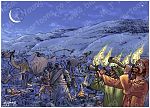Bible Cartoon: Judges 06 - Gideon - Scene 04b - Gideon in the winepress
Click on Add to cart button below shopping cart.
Purchased Bible Cartoons do not have watermarks. Links to Cartoons provided on email once purchase is completed.Bible Book: Judges
Bible Book Code: 0700601102
Scene no: 1 of 2
Bible Reference & Cartoon Description
Judges 6:11 (NLT)
[Then the angel of the Lord came and sat beneath the great tree at Ophrah, which belonged to Joash of the clan of Abiezer.] Gideon son of Joash was threshing wheat at the bottom of a winepress to hide the grain from the Midianites.
DRAWING NOTES:
TIME OF DAY:
Unspecified I the Bible narrative. I have set this scene in the early morning.
LIGHTING NOTES:
The yellow/orange clouds in the sky are illuminated by the sun (unseen), low on the horizon & on the right, casting vague shadows to the left & below the figure & objects.
CHARACTERS PRESENT:
Gideon.
Mouse on the step.
RESEARCH/ADDITIONAL NOTES:
This scene shows Gideon in a stone-cut wine press, threshing wheat. He was a bundle of wheat in his hands & is beating it against a wooden log to release the grain from the straw. This meant that the grain was still mingled with the chaff (the seed coverings, crop leaves, stalks and other debris). To seperate the unwanted chaff from the grain people often threw the wheat into the air (especially in windy conditions) allowing the wind to blow the lighter chaff away, & catching the heavier grain in a mat or basket. This process was called winnowing.
Why was Gideon threshing wheat in such an unexpected place: the bottom of a wine press? Because he was fearful that the marauding Midinites, et al, might see his secretive work & steal what little food he & his family might make from the grain.
Above the rim of the wine press we can see some buildings on the right (part of the town of Ophrah), & the great tree at Ophrah, an oak tree, on the left, under which the angel of the Lord sat.
Here’s the scene without the figure of Gideon.

Background of Judges 06 – Gideon – Scene 04b – Gideon in the winepress
Click on the colour bar below to view/buy this Background:
Background of Judges 06 – Gideon – Scene 04b – Gideon in the winepress

Map - The 12 Judges home towns or locations
Click yellow bar below to see Maps: The 12 Judges home towns and locations, with download & purchase options:
Map – The 12 Judges home towns or locations
Notes about winemaking and wine presses.
Winemaking involves three steps: harvesting the grapes from vines; pressing the grapes in order to release their juice & fermenting the juice into wine. These core elements of wine production have been with us for thousands of years. In Biblical times, the treading of grapes (by people’s feet) was typically carried out in a pit, dug out of the ground. Often the pit had two levels, the upper one being where the grapes were trodden; the lower one where the grape juice flowed to, via a channel, prior to being collected in jugs/vessels & then stored locally for the fermentation into wine. The walls of the lower pit were plaster-coated, to retain the grape juice.
To get down into the winepress there would often be a step of two, cut into the rock. In my drawing you can see the step on the right hand side. There is a mouse on the step, looking at Gideon!
Winepresses were an important feature of ancient Israel; many being found throughout the Mediterranean region. Wine was a staple in the Mediterranean diet, often being safer to drink than water. The production of wine was very important in Biblical times, so much so that the Bible frequently mentions it. Wine has been used in the Bible as a metaphor for God’s blessing on people.
The location of a winepress was important since it needed to be close to the vineyards to minimize the time and effort required to transport the grapes into it. The grape vines were often grown on the sides of hills, benefiting from the warmth of the sun. Winepresses were often located on those hillsides, where the grapes could be easily brought down and processed locally.
Bible Doctrine Notes
6:11-40 EVIL AND SUFFERING, God’s Present Help (2.33D)
God alleviated Israel’s suffering by calling Gideon to be a judge. Gideon was looking for miraculous divine intervention, unexpectedly (for Gideon!) the Lord God sent him to be the relief the Israelites wanted from the marauding Midianites. Similarly, we can not always expect divine intervention to lead us out of trouble, instead we must be ready to answer God’s call in obedience action. In so doing, we express our faith in God’s help, via us. God often chooses to use us to achieve his ends, rather than show his miraculous power. He can use his divine, miraculous power, but often chooses to work His miracles through ordinary, but committed, obedient, human beings.
6:11-24 REVELATION, Messengers (3.21G)
Gideon was discouraged and confused regarding God’s actions in Israel’s current difficulties with the Midianites. He had only heard of God power from parents and teacher, he had no first hand experience himself. Gideon felt that God had abandoned his people, since his generation had not seen God’s saving actions.
Gideon responded with surprise to the messenger of God, but as though the messenger were God himself, fearing for his (Gideon’s) life after seeing the angelic messenger face to face.
6:11-24 PRAYER, Will of God (5.52B)
God’s usual response to Israel’s cry for help was to send a deliverer (or Judge).Gideon’s calling came in the form of a dialogue with the Creator. Gideon honestly voiced his frustration and sense of abandonment to God. He then claimed to be unqualified to be the divinely appointed deliverer of Israel. God provided a visible sign to reassure Gideon and then called Gideon to action. Gideon does not provide a model of how we should always pray to God. However, his prayer dialogue does show us that God will listen to our complaints, our frustrations, and our sense of inadequacy.





